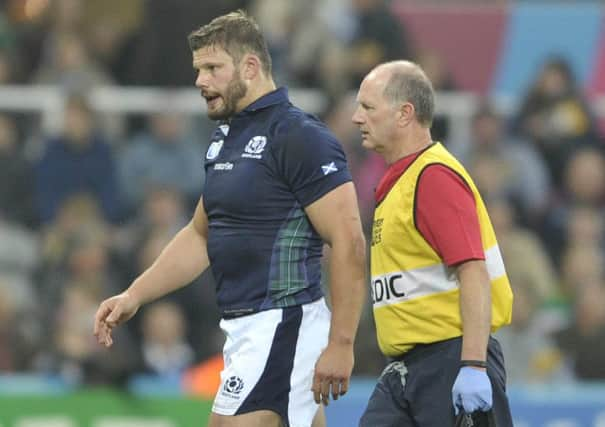Scotland to face Australia with a clean bill of health


While other nations have seen players drop like flies through the course of a punishing pool stage, head coach Vern Cotter has been blessed by a miraculously low casualty count and Dr Robson is keen to stress the element of luck, but having one of the the leading medics in the rugby world has surely done Scotland no harm.
That is not to say that the long-serving SRU head of medical services, who also has six Lions tours on his CV, has had an easy time of it. While tournament-ending injuries have been mercifully rare – only lock Grant Gilchrist has had to head home – the squad requires constant management and the Samoans inflicted enough wounds to keep the doc and his staff on their toes.
Advertisement
Hide AdAdvertisement
Hide AdEveryone involved in the bone-shuddering contest at St James’ Park has required treatment but Dr Robson is sure they will all soon be fighting fit for the Wallabies.
He said “I’m relishing the fact we’ve got an eight-day turnaround, so that means we can frontload it with a couple of days of really quality recovery. That’s key to getting them moving freely, enjoying their body again. At the moment I’m sure they’re thinking ‘Oh my god, I wish I was in somebody else’s body’. It’s definitely a benefit having the extra days.
“On Saturday night they had slightly more leeway. They’ve made the quarter-finals, so, yeah, you can have a couple of beers, that’s fair enough, but you’ve got to be on that bus for pool recovery in the morning. Everybody to a man turned up for that.”
Robson has been a leading figure in the moves to regulate concussion return-to-play protocols and said he is happy with the way the new system is working.
“There is only one boss in that decision,” he said. “I would possibly get into trouble with people with the language I sometimes use but I use the same language as the players, so if they tell me to f-off on the pitch I simply reply in the same vernacular. Sometimes you have to be careful, though. Because they have a head injury they are actually not responsible for what they are saying. Quite often they will be more aggressive than normal – I once, many years ago, had one of the players take a right hook to me because he thought I was the opposition peering over him.
“You have got to measure your time. Other times they get in a combative state, really very aggressive, other times crying like a baby, other times just a bit confused. Other times the team-mates make the diagnosis – ‘Doc he is not right, he doesn’t know the calls’ – things like that. There is a whole spectrum of things going on.”
Scotland missed flanker John Hardie for the United States and South Africa games because he had not quite fulfilled every aspect of the return-to-play protocols. These require cognitive and memory tests, with baselines taken when they are at optimum health.
Robson said: “It can be very subtle. John Hardie clashed heads with David Denton in the last minute and a half of the game [against Japan]. One had a big cut to his forehead, one had a big cut on the back of his head. That is not unusual and he [Hardie] appeared to function fine, but, after the match, the matchday doctor came along and said ‘let’s just have a look at that footage together’ and we determined that he was a little bit slow getting up. I thought he was not concussed but was a little uncertain, so we carried on the process and a couple of days later one of his tests is just a bit off. Therefore, err on the side of caution and take him in. That is not a popular decision with the coaching staff, but is one they support because you could lose him for the tournament if you don’t manage him correctly.
Advertisement
Hide AdAdvertisement
Hide Ad“That is the big thing that coaches see. ‘Yeah I might lose him for a game and that is inconvenient, I would love to have him playing against South Africa but, if we do that, we might not have him for Samoa or the quarter-final which are even bigger games’.”
Robson has witnessed first hand from the front-line the constant amping up of physicality in rugby’s professional era and added: “It’s difficult to know just now whether this World Cup is more attritional. We’ll only know when the powers that be get the stats together. You can sometimes frontload injuries then sail through the rest of the tournament. The headline is what’s happening to the Welsh, but I think everybody has had some injuries.
“I thought after the South Africa Lions tour [in 2009] that we couldn’t possibly go more physical. I’m just amazed at the supreme athletic prowess of the guys that we’ve got. That in itself leads to bigger collisions. Whether they’re better conditioned to cope with these collisions is a moot point.”